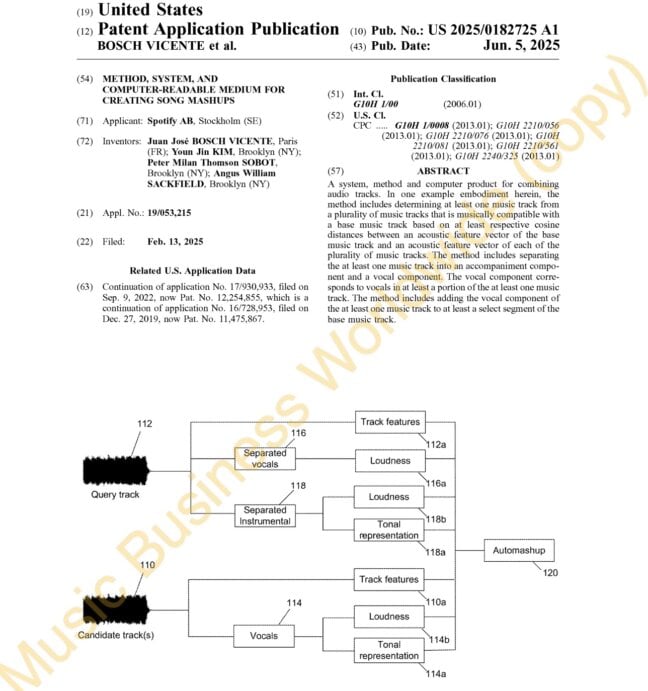Streaming giant Spotify has quietly secured a patent for technology that would allow automatic generation of song mash-ups, at the same time that it simultaneously announces a broader collaboration with the world’s major record labels on “artist-first” generative-AI tools. The two moves, taken together, mark a significant moment in how the streaming business may evolve, and what it could mean for listeners, artists and the wider EDM community.
Patent disclosure: what’s actually patented?
According to a report from Music Business Worldwide, Spotify holds a patent filing describing a system that:
- Analyses songs to determine which tracks are musically compatible, then automatically combines them into new mashup versions for individual users.
- The method would separate tracks into component parts (vocals, instrumentals) and then layer one track’s vocal component over the backing of another track — provided they match in tempo, key, harmony, etc.
- The filing mentions “acoustic feature vector distances,” tempo/harmony matching, pitch shifting, time-stretching, and “transition refinement” to make mashups sound smooth.
- Importantly, one Spotify spokesperson told MBW that the patent is “unrelated to last week’s announcement” around the label AI partnerships.
What does this mean in practical terms? In theory, you might pick a “base track” (say an instrumental or a vocal track) and Spotify’s system could automatically suggest or build combinations with other tracks that are musically compatible, creating personalized mash-ups tailored for you.
Partnerships with major labels: the AI angle
On October 16 2025, Spotify announced it is partnering with the three major music companies, Sony Music Group, Universal Music Group and Warner Music Group, along with independent rights-holders such as Merlin Network and Believe, to develop “responsible” AI music products.
Key details from that announcement:
- Products will be built “artist-first” around four principles: upfront licensing, artist choice, fair compensation, and fan connection.
- Significant investments in AI research and product development, including a generative-AI research lab.
- A focus on ensuring that rights-holders and creators remain central as AI innovation unfolds.
Spotify emphasized: “Musicians’ rights matter. Copyright is essential. If the music industry doesn’t lead in this moment, AI-powered innovation will happen elsewhere, without rights, consent, or compensation.”
So while the mash-up patent is about what Spotify could allow fans to do, the label-partnership announcement is about what Spotify plans to allow creators and right-holders to do (or control) with AI tools. The two initiatives may be related strategically even if not explicitly linked.
Conclusion
While not every patent turns into a product, Spotify’s mash-up filing shows the company is thinking beyond traditional streaming. Combined with its major label collaborations, it signals a shift toward more interactive, AI-driven experiences, ones that could reshape how fans discover and connect with music.
For the EDM community in particular, where remixing and mash-ups are already at the heart of the culture, these developments could open new creative possibilities. Whether they become a staple feature or remain a concept on paper, Spotify’s latest moves highlight how quickly the boundaries between listening and creating are starting to blur.
*Cover image credit: Eduardo Munoz Alvarez




